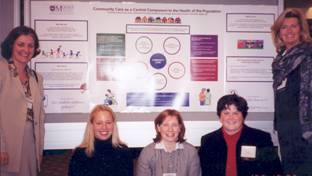Student Awards
2007 S. McEvenue, Award for MSVU’s Best Thesis 2006-2007
2006 (2yr) D. Dill, MA FSGN, Nova Scotia Health Research Foundation ($35,648)
2004 (1yr) S. White, M.Ed., SSHRC MCRI Student Stipend ($12,000)
2004 M. Manning, Award for MSVU’s Best Thesis 2003-2004
2003 (1yr) J. Colepaugh, MA FSGN, SSHRC MCRI Student Stipend ($12,000)
2003 (2yr) G. Hawkins, MA FSGN, Nova Scotia Health Research Foundation ($15,648); Healthy Balance ($20,000)
2003 (1yr) C. Kennedy, MA FSGN, Healthy Balance Research Program ($10,000);SSHRC MCRI Student Stipend ($6,000)
2003 (2yr) S. McEvenue, MA FSGN, Nova Scotia Health Research Foundation($35,648)
2002 (1yr) G. Hawkins, MA FSGN, CIHR Student Stipend ($16,000) Building Capacity at MSVU
2002 (1yr) K. Hemeon, MA FSGN, Healthy Balance Research Program ($10,000)
2002 (1yr) C. Kennedy, MA FSGN, CIHR Student Stipend ($16,000) Rural Healthy Aging
2002 (2yr) M. Manning, MA FSGN, Nova Scotia Health Research Foundation($15,648); Healthy Balance Research Program ($20,000)
2002 (1yr) P. Thille, MA WS, CIHR Student Stipend ($16,000) Rural Healthy Aging
_________________________________________________________
Student Thesis Projects
Thea Brown:
Assessing the physical environment in adult day programs for persons with dementia.
Shannon McEvenue:
Palliative care in long-term care: A multi-methods approach to assessing quality.
Donna Dill:
Recruitment of home support workers in
Nadine Brun:
Geographical location and its effect on the needs of people caring for individuals with dementia.
Sheri Bonnar:
Widows and intimacy: “I just need a friend”.
Jennifer Colepaugh:
Lessons to be learned: A gender-based policy analysis of international direct compensation policies for informal caregivers.
Shawna Elliott:
Factors influencing the recruitment and retention of continuing care assistants in
Lindsay Engel:
Gender Differences in Formal Service Utilization Patterns
Glenda Hawkins:
Patterns and predictors of home care utilization in
Kate Hemeon:
The experience of anticipatory grief and loss in spousal caregivers of persons with Alzheimer Disease.
Carla Johnson:
Women and homelessness: Community responses.
Christine Kennedy:
Service utilization among adults with disabilities and seniors: Making a case for self-managed care.
Marlie Manning:
Causes and consequences: The histories of home care policies in three provinces.


Students at the Gerontology Student poster presentation at the
Association of
conference,
______________________________________________________________________________
Student Bios
Nadine Brun is working towards her MA in Family Studies and Gerontology. Her thesis topic is “Geographical location and its effect on the needs of people caring for individuals with dementia”. Nadine has worked on a number of projects with the Nova Scotia Centre on Aging and the Maritime Data Centre, including the C.A.R.E. Tool project, Healthy Balance, and most recently, “Projecting the Housing Needs of Aging Atlantic Canadians” research project.
Shannon McEvenue recently completed her MA in Family Studies and Gerontology and received the MSVU award for Best Thesis 2006-2007. She was granted a two year Student Research Award ($35,648) in 2003 through the Nova Scotia Health Research Foundation. Shannon’s research focused on palliative care programming in the long-term care setting. Shannon is currently employed as a Research Assistant on the “Nexus Home Care Project- Nova Scotia Site”.
Donna Dill conducted research on recruitment and retention of Continuing Care Assistants in Nova Scotia. She was awarded funding from the Nova Scotia Health Research Foundation to complete her thesis, entitled, “Factors influencing recruitment and retention of continuing care assistants to home care in Nova Scotia”.
Sheri Bonnar conducted her research in the area of widows and intimacy. The purpose of this research entitled, Widows and Intimacy: I Just Need a Friend, was to examine the experience of widows who develop new intimate dating relationships in later life. As a critical study, this research uses the experiences of both widows and adult children as a starting point for analysis of the ideologies of gender and familialism embedded within those experiences.
Jennifer Colepaugh conducted research in the area of compensation for informal caregivers. Her thesis topic is entitled, Lessons to be learned: A gender-based policy analysis of international direct compensation policies for informal caregivers. She received funding support from the Major Collaborative Research Initiative “Hidden Costs/Invisible Contributions: The Marginalization of Dependent Adults” from which her thesis emanates.
Shawna Elliott studied recruitment and retention of continuing care assistants in Nova Scotia. Funding for this research was received through the Health Care Human Resource Sector Council where Shawna is employed as Project Officer. Her recent research experience includes areas of health human resources, home care, caregiving, and continuing care. In 2001, she was awarded the Gerontology Association of Nova Scotia Award of Excellence.
Glenda Hawkins conducted her thesis research on the patterns and predictors of home care utilization in Canada. She was awarded a 2 year scholarship in 2003 through the Nova Scotia Health Research Foundation ($15,648) and the Healthy Balance Research Program ($20,000). In 2002 Glenda received a CIHR Student Stipend ($16,000) through MSVU to help build capacity in home and continuing care research. At the Maritime Data Centre, Glenda has worked on several projects involving projecting the future availability of informal supports and has analyzed data from the 2005 Healthy Balance Survey on Nova Scotians involved in caring relations.
Kate Hemeon received a $10,000 research scholarship through the Healthy Balance Research Program to conduct her thesis research on The Experience of anticipatory grief and loss in spousal caregivers of persons with Alzheimer Disease. She has presented her research at the 2002 Canadian Association on Gerontology (CAG) Conference, The Alzheimer Society of Nova Scotia 14th Annual Fall Conference and the 2003 CAG Conference. Her research interests include Alzheimer Disease, caregiving and rural health issues. At the Maritime Data Centre for Aging Research and Policy Analysis, Kate worked on the research project “Net Loss Population Settlement Patterns and Maintenance of Rural Health Status: A Case Study in Atlantic Canada” and as a project manager on “From Research to Practice: Assessing Caregivers of Persons with Alzheimer Disease, an Evaluative Study“.
Carla Johnson conducted an institutional ethnography on the experiences of homeless women who are 55 years of age and older. The impetus for this research evolved from a research project in which she was the principal investigator with the Community Action on Homelessness. The project involved the development of a database of agencies that serve the homeless population in the Halifax Regional Municipality. Her background is in Social Work and Gerontology. At the Maritime Data Centre for Aging Research and Policy Analysis, Carla worked as a research assistant on the research project “Healthy Balance: A Community Alliance for Health Research on Women’s Unpaid Caregiving”.
Christine Kennedy conducted her research on the feasibility of self-managed care policies for the aging Canadian population. She was awarded a one-year scholarship in 2003 through the Healthy Balance Research Program ($10,000). Christine also received a CIHR Student Fellowship ($16,000) in 2002 through MSVU to assist in providing a quantitative analysis of helping patterns in rural Atlantic Canada. In 2003, Christine worked on the research project “Net Loss Population Settlement Patterns and Maintenance of Rural Health Status: A Case Study in Atlantic Canada” and in 2004 began work on the MCRI project, “Hidden Costs/Invisible Contributions: The Marginalization of Dependent Adults”.
Marlie Manning’s thesis addressed home care policy for the frail elderly. Why does policy change, and to what effects on its users and their networks of caregivers? Her assumption is that there are lessons from history that can be incorporated into strategic thinking of policy-makers. She is the recipient of a 2-year award from the Nova Scotia Health Research Foundation ($15,648) and the Healthy Balance Research Program ($20,000). Marlie worked as a research assistant on the project, “Projecting the Future Availability of Informal Supports and Assessing its Impacts on Home Care Services”.